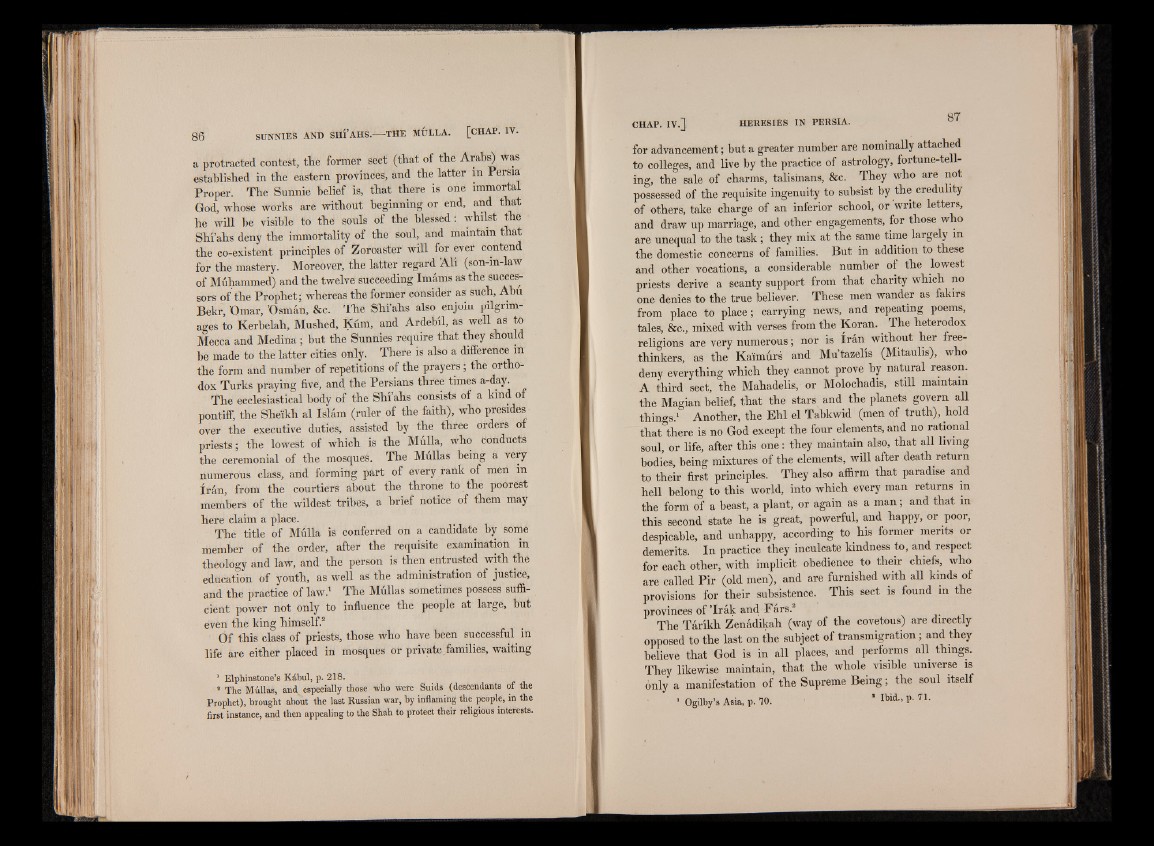
a protracted contest, the former sect (that of the Arabs) was
established in the eastern provinces, and the latter in Persia
Proper. The Sunnie belief is, that there is one immortal
God, whose works are without beginning or end, and that
he will be visible to the souls of thé blessed: whilst the
Shiahs deny the immortality of the soul, and maintain that
the co-existent principles of Zoroaster will for ever contend
for the mastery. Moreover, the latter regard All (son-in-law
of Muhammed) and the twelve succeeding Imams as the successors
of the Prophet; whereas the former consider as such, Abu
Bekr, ’Omar, ’Osman, &c. The Shi’ahs also enjoin pilgrimages
to Kerbelah, Mushed, Kûm, and Ardebil, as well aS to
Mecca and Medina ; but the Sunniës require that they should
be made to the latter cities only. There is also a difference m
the form and number of repetitions of the prayers ; the orthodox
Turks praying five, and the Persians three times a-day.
The ecclesiastical body of the Shi’ahs consists of a kind of
pontiff, the Sheikh al Islâm (ruler of the faith), who presides
over the executive duties, assisted by the three orders of
priests; the lowest of which is the Mulla, who Conducts
the ceremonial of the mosques. The Mullas being a very
numerous class, and forming part of every rank of men in
Iran, from the courtiers about the throne to the poorest
members of the wildest tribes, a brief notice of them may
here claim a place.
The title of Mulla is conferred on a candidate by some
member of the order, after the requisite examination in
theology and law, and the person is then entrusted with the
education of youth, as well as the administration of justice,
and the practice of law.1 The Mullas sometimes possess sufficient
power not only to influence the people at large, but
even the king himself.2
Of this class of priests, those who have been successful in
life are either placed in mosques or private families, waiting
1 Elphmstone’s Kâbul, p. 218.
! The Mullas, and especially those -who were Suids (descendants of the
Prophet), brought about the last Russian war, by inflaming the people, in the
first instance, and then appealing to the Shah to protect their religious interests.
for advancement; but a greater number are nominally attached
to colleges, and live by the practice of astrology, fortune-telling,
the sale of charms, talismans, &c. They who are not
possessed of the requisite ingenuity to subsist by the credulity
of others, take charge of an inferior school, or write letters,
and draw up marriage, and other engagements, for those who
are unequal to the task ; they mix at the same time largely in
the domestic concerns of families. But in addition to these
and other vocations, a considerable number of the lowest
priests derive a scanty support from that charity which no
one denies to the true believer. These men wander as fakirs
from place to place; carrying news, and repeating poems,
tales, &c., mixed with verses from the Koran. The heterodox
religions are very numerous; nor is Iran without her freethinkers,
as the Kaimurs and Mu’tazelis (Mitaulis), who
deny everything which they cannot prove by natural reason.
A third sect, the Mahadelis, or Molochadis, still maintain
the Magian belief, that the stars and the planets govern all
things.1 Another, the Ehl el Tabkwid (men of truth), hold
that there is no God except the four elements, and no rational
soul, or life, after this one: they maintain also, that all living
bodies, being mixtures of the elements, will after death return
to their first principles. They also affirm that paradise and
hell belong to this world, into which every man returns in
the form of a beast, a plant, or again as a man; and that in
this second state he is great, powerful, and happy, or poor,
despicable, and unhappy, according to his former merits or
demerits. In practice they inculcate kindness to, and respect
for each other, with implicit obedience to their chiefs, who
are called Pir (old men), and are furnished with all kinds of
provisions for their subsistence. This sect is found in the
provinces o f ’Irak and Pars.2
The Tarikh Zenadikah (way of the covetous) are directly
opposed to the last on the subject of transmigration; and they
believe that God is in all places, and performs all things.
They likewise maintain, that the whole visible universe is
only a manifestation of the Supreme Being; the soul itself
1 Ogilby’s Asia, p. 10. ) * Ibld-> P- 71-